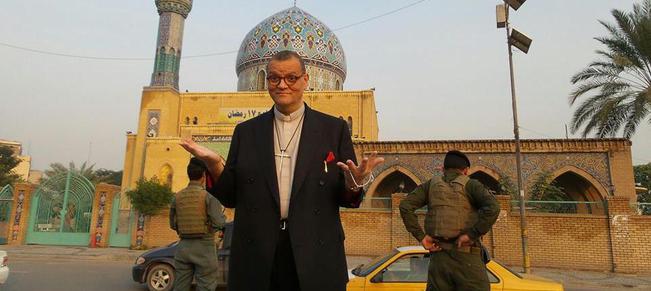Canon Andrew White, also known as 'the vicar of Baghdad', has been found to have committed serious financial misconduct that was likely to cause damage to the charity he worked for.
The Charity Commission has also found that the charity, Foundation for Relief and Reconciliation in the Middle East, had a trustee board that had ineffective oversight of him.
He denies misconduct and you can read his comments here.

Canon White was the only Anglican priest in Iraq and President of the Foundation for Relief and Reconciliation in the Middle East (FRRME), a Christian charity that works in conflict resolution, relief and Christian mission work.
The Commission investigated FRRME after the charity reported in 2016 that White was believed to have transferred $17,500 from a fundraising event for the charity's US branch to terrorist organisation Islamic State to secure the release of two young female hostages who were at risk of death or becoming sex slaves.
The report reveals that in emails written by White it appeared he intended to secure the release of the individuals from IS but that, despite his intent to do so, there is no evidence that it happened, nor was financed with charity money.
One email reads: "I did not want to take money from [the foreign organisation] so I gave the money to [Person 1] myself from the money I had been given in the US. I have been told specifically that no money given to deal with the sex slaves could go through the [charity], so I dealt with the issue myself."
The report also says he repeatedly failed to abide by financial controls put in place by the trustees. He used a charity credit card for frequent personal expenditure, repeatedly attempted to commit to payments and staff hiring without seeking authorisation from trustees and that only 5 per cent of his £38,521 charity credit card expenditure could be supported by evidence.
The regulator suspended White as a trustee and he subsequently resigned. Investigators shared information with the Metropolitan Police, which carried out its own investigation into allegations of terrorist financing. White was interviewed under caution but later informed that no further action would be taken against him.
The inquiry, which refers to White throughout as ‘Trustee A’, found that, overall, White's actions fell well below that expected of a charity trustee, saying: "The inquiry concludes that Trustee A's conduct amounted to serious misconduct and/or mismanagement, likely to have caused significant damage to the charity's income and reputation."
Much of the criticism though is aimed at the trustees, who the Commission says "failed to address this repeated pattern of behaviour" and "had ineffective oversight of his actions and financial controls were not consistently applied robustly".
They did put steps in place such as assigning staff to travel with him, instructing venues that funds raised at events should be paid to the charity, reminding him of correct procedures and requiring new projects and recruitment to be approved by the trustees, however the Commission says these were often done in response to his failure to comply with an existing control.
The inquiry also found gaps in the charity's record-keeping, including relating to donations made to churches overseas.
"Concerning patterns of behaviour by Trustee A were not effectively dealt with, despite trustees having opportunities to do so."
The report highlights that improvements have already been made to the management of the charity, including the appointment of three new trustees and a new CEO.
Mike Simpson, the current Chief Executive of the charity said: "The events of 2016 recounted in the Charity Commission report prompted swift action by the Trustees. This included major improvements to the governance of the charity.
"The Commission acknowledges that the Trustees co-operated with the inquiry throughout and recognises the steps taken by the Trustees which put the charity in a much stronger position going forward. I am delighted to have been able to assist the Trustees in making these improvements. I believe that this robust and effective governance enables the charity to move forward with confidence. We have a mission to bring hope, help and healing to the Middle East and we are demonstrating our ability to do that through the generosity of our supporters across the world."
Tim Hopkins at the Charity Commission said: "Our inquiry has uncovered a pattern of concerning behaviour from one trustee who put this charity at risk, demonstrating a disregard for the standards and behaviours expected of them. Trustees should honour their responsibility and legal duty to act in the best interests of their charity at all times.
"Although the charity's other trustees were clearly let down, they failed to intervene effectively as we would have expected. Trustees have a responsibility to safeguard and protect their charity.
"I welcome the significant progress that has been made here. I hope that these improvements will enable the charity to make a positive difference for the people it was set up to help."
The inquiry noted that some of his behaviour could have been related to ill health and how that may have made it harder for the trustees to manage Canon Andrew White's account.
The report ends with a warning to all charities, saying they are "jointly and equally responsible for the management of their charity”. It calls on them to ensure their charity is managed in accordance with its governing document and general law.
The full report can be read here





